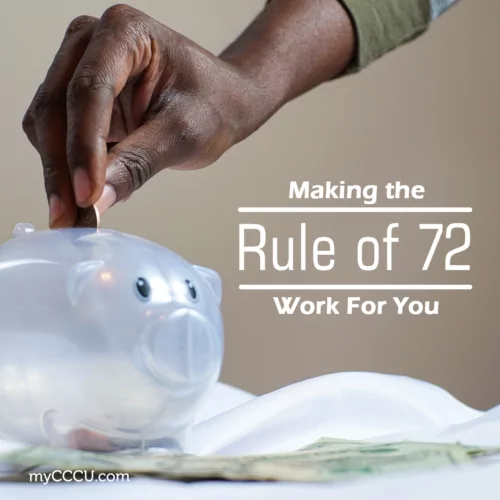
You’ve probably heard that putting your money into interest-bearing accounts can make it grow. But do you know how much it grows? And do you know how long it would take your money to double? That’s what the Rule of 72 can tell you. The Rule of 72 is a handy formula that can help you understand compound interest. Compound interest is the interest that your account earns if you leave all your money right where it is.
If you know the rate of interest your account has, you can use the Rule of 72 to figure out how long it would take for your money to double at that rate. Just divide the number 72 by the rate of interest that your account earns and you’ll find out.
Years to Double Your Money = 72/Your Account’s Interest Rate
For example, if you have your money in a certificate account that has a 2% interest rate, it will take 36 years for your money to double. (72 divided by 2 equals 36.) If you have an investment account that has about a 6% rate, your money will double in 12 years. (72 divided by 6 equals 12.) But if you have your money in a big-bank savings account that only gets 0.01% interest, it would take you 7,200 years to double your money!How is this possible? It might sound complex, but it’s really not. It’s all due to compound interest. When your money is in an interest-bearing account, it will grow thanks to interest. The interest you earn in one year will stay and gather more interest over the next year. This is how your money doubles over time. You don’t need to be a math whiz to know that compounding is good for growing your money!
Of course, the rule of 72 also applies for interest on debts. If you are paying 20% interest on your credit card debt, in about 4 years you’ll have paid double what you originally owed. That’s a great reason to pay off your debts as soon as possible! (You might also want to look into a lower-rate credit card.)
Using the rule of 72 is a smart way to track the growth of your savings. Make sure to compare rates to get the best return you can on your money. And remember that there are other options besides a regular savings account to get that compound interest going.
This article should not be considered legal, tax, or financial advice. You may wish to consult a tax or financial advisor about your individual financial situation.



